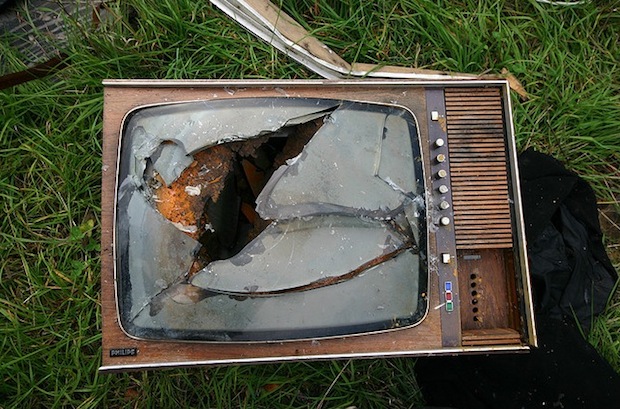
Philips is selling its TV business to a Chinese volume manufacturer, trading dwindling profits for a licensing fee. It's a sign that flatscreen TVs have become a commodity--and the industry could be primed for a digital make-over led by firms like Apple.
Philips has been producing TVs since 1928, but it's now disposing of 70% of its TV business into a partnership with TPV Technology limited, a Hong-Kong-based manufacturer. The Dutch company will retain the last 30% of the business, and stands to receive over €50 million in royalties from the deal, starting in 2013. That's quite a turn-around from the current situation, which saw Philips' finances take a €87 million loss in the first quarter of this year alone from its TV division. It's not the first time Philips has done a deal with TPV--in 2004 it sold a similar majority stake in its computer monitors business for the equivalent of $358 million. As part of this latest deal, all 4,000 employees of Philips TV division will move to TPV, which will also have a positive impact on the company's bottom line as those staff costs are now borne elsewhere.
As Bloomberg notes, Philips was the last remaining mass manufacturer of TVs in Europe. So what can we conclude from this deal? It's pretty simple at heart: The LCD/plasma flat screen revolution in the TV industry is over. The bulky cathode-ray tube TV of old is now consigned to history, and the rush make millions by getting every consumer in the developed world hooked up to an "HD-ready" 1080p television is completed--to the extent that the TV business isn't about pushing revolutionary changes anymore. Instead it's a commodity business dominated by narrowing margins and dropping prices that has no room for Philips high-end TVs like the Aurea line which illuminates the wall behind the screen with LED colors that match the TV picture. Philips' new Chinese partner will run the business on a mass-sales, low profit-per-unit basis.
Meanwhile, the tech world is abuzz with rumors that Apple is about to enter the TV game. This rumor has been surfacing and then sinking again for years, but seems to have returned with some vigor. Insiders in the Chinese manufacturing game are apparently indicating Apple is working on a digital TV solution, expanding on its existing "hobby project" Apple TV--a small set-top box based on the technology inside the iPhone. The technology isn't necessarily revolutionary: Google and Yahoo already have hardware/software connected TV solutions on sale, Netflix and its ilk are rapidly changing the way consumers think about on-demand Net-streamed TV solutions, and set-top boxes are becoming more common. Is this the "perfect storm" moment for Apple to sweep in with a product in this market--something sleek, large, expensive, with a glossy UI and a unique take on how people interact with their TVs?
That argument is compelling, particularly if you remember what folks said when the iPod arrived--it was a tech other people were already selling, Apple's invention was clever but too expensive...and so on. Then the same thing happened with the iPhone--commentators thought Apple was going to fail at tackling such an entrenched industry, where commoditization was rife (led by firms like Nokia and Motorola). And then came the iPad--which doubters questioned on the basis of "who wants a device like this for $500?" and which has since sold by the tens of millions.
Then there are a few rumors that Cirrus Logic, a supplier for audio components to Apple, has suffered technical problems with production yields of a chip it's supplying in bulk for a new device...is this why the iPad is suffering some delays in making it to the shelves, or is it for a new TV--a device that would be audio-heavy. Remembering that rumors suggest Apple is moving its iPhone update schedule to August or September, this would mean there's a PR slot in the Summer that Apple could exploit for a new device.
End of one era is d beginning of a new one....
ReplyDeleteA time is marked not so much by ideas that are argued about as by ideas that are taken for granted. The character of an era hangs upon what needs no defense.